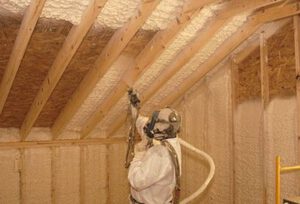Spray Foam Insulation Contractors
If you’ve been thinking of getting your house insulated with spray foam, you have a few options. Spray Foam Insulation Contractors can spray the material with specialized equipment. They also wear protective gear to minimize the risk of injury. In addition, foam insulation contractors will make sure that the site is cleaned up after the job is finished and that no unneeded materials remain on the property. They will also allow the building to be re-occupied after twenty-four hours.

Open-cell spray foam insulation contractors use a special foam that is essentially a cell that is sprayed into space. These foams have a higher R-value per inch and can be used in tight spaces. They also cost less to manufacture than closed-cell foam.
Open-cell spray foam insulation is one of the best types of insulation available. It is ideal for attics, crawl spaces, and walls and is code-compliant. The product has a low VOC content and is easy to work with. Contractors can use it to insulate walls, attics, and garages without the hassle of cutting or tearing.
Open-cell spray foam has room inside every cell, so it is less rigid and more flexible. It will also allow water to pass through it, which makes it a good choice for exterior applications. The foam is also good for dampening sound waves, which means that it can make a home quieter.
Unlike open-cell spray foam, closed-cell foam insulation is stronger and more durable. Because it has a low expansion rate, it can make the structure of your home stronger. Since closed-cell foam is also harder to break than open-cell foam, it will prevent unwanted water and air from penetrating your building.
Open-cell spray foam insulation is more environmentally friendly than closed-cell foam. Closed-cell spray foam is more expensive and requires more material to insulate the same area. Nevertheless, this type of insulation is the most effective option for commercial applications. This type of foam has a high R-value and is highly effective in hot and humid climates.
The cost of open-cell spray foam insulation is about $0.44 per square foot. This cost includes labor. In addition, the cost will vary based on the size of the project and the cost of materials. Depending on the thickness of the spray foam, a typical project can cost between $3,200 and $26,000.
Costs of closed-cell spray foam insulation can vary dramatically from company to company. It’s important to understand how these different prices compare with one another. Some companies charge more per board foot, while others charge less. A closed-cell spray foam insulation is stronger and denser than its open-cell counterpart, and it also requires less insulation for the same R-value. It adheres to a variety of surfaces, including PVC, brick, and wood.
The cost of closed-cell spray foam insulation may vary depending on the location and size of the building. A typical application of one inch of closed-cell spray foam will cost about $1,600 to $2,400. This type of insulation is superior to open-cell spray foam because it has the highest thermal resistance.
New-build homes may also benefit from a discount on closed-cell spray foam insulation. These buildings tend to have fewer installation challenges and therefore can qualify for greater volume discounts. A new home’s closed-cell spray foam insulation cost per square foot is typically 15 to 20 percent less than an existing home.
A two-inch layer of closed-cell spray foam can cost anywhere from $3 to $4 per square foot. This is enough to provide a good air seal for most residential projects, including those involving open walls, crawl spaces, and rim joists. However, larger applications may require more closed-cell spray foam insulation.
Closed-cell spray foam insulation has a higher R-value per inch than its open-cell counterpart, which is usually 6 to 7 inches thick. A 2-inch application of open-cell spray foam can have an R-value of 7.6 while a 3-inch application of closed-cell spray foam can have R-values of 14 and 21 respectively. The thickness of closed-cell spray foam will determine the amount of foam required to achieve the desired R-value for your home. If you are uncertain, you can check with Energy Star for the recommended R-value for your area.
The cost of closed-cell spray foam insulation varies by location and square footage. If you are insulating an entire building, you will need more than one sheet of closed-cell foam. If you are just insulating a small section of your building, you will need less than one sheet of closed-cell spray foam.
